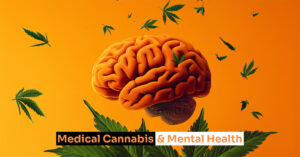News
News and current information at a glance
Medical Cannabis and Mental Health:
Let's break it down

Medical cannabis has grown into a significant area of interest within mental health treatment, offering hope to those struggling with conditions like anxiety, depression, PTSD, and more. With promising evidence and positive patient reports, researchers and clinicians are investigating how cannabinoids, the active compounds in cannabis, can be integrated into mental health care. However, understanding the role of medical cannabis in mental health requires navigating a complex landscape of scientific research, legal considerations, and individual patient needs.
The connection between cannabis and mental health is rooted in our body’s endocannabinoid system (ECS), a network of receptors that regulates mood, sleep, appetite, and stress responses. Cannabinoids, such as THC and CBD, interact with this system, modulating neurotransmitter release and potentially influencing symptoms of mental health disorders. For instance, CBD, known for its calming and non-psychoactive properties, is being studied for its ability to reduce anxiety, promote relaxation, and even ease symptoms of depression. THC, the compound responsible for cannabis’s psychoactive effects, may also offer benefits, although it requires careful dosing due to its potential to induce anxiety or paranoia at higher levels. Balancing these effects is key to developing effective treatment protocols that maximise therapeutic benefits while minimising risks.
Anxiety and depression are two of the most common mental health conditions globally, affecting millions of people each year. Traditional treatment often includes therapy, medication, or a combination of both, but many patients find these approaches inadequate or experience difficult side effects. Here, medical cannabis offers a potentially transformative alternative. Preliminary studies suggest that CBD may reduce anxiety levels, making it a promising option for social anxiety disorder, generalized anxiety, and panic disorders. Furthermore, it has shown potential as an adjunct to traditional treatments, helping patients feel more grounded and at ease in therapeutic settings. This dual approach, combining medical cannabis with therapy, is gaining traction as a holistic, patient-centered method.
PTSD, another area where medical cannabis shows promise, is a complex condition that affects not only combat veterans but also survivors of trauma, including assault, natural disasters, and severe accidents. People with PTSD often experience intrusive memories, nightmares, and heightened anxiety, which can interfere with daily life. For some, medical cannabis offers relief by reducing the frequency and intensity of these symptoms. Certain strains and cannabinoid ratios can help stabilize mood, reduce hypervigilance, and improve sleep, potentially allowing individuals with PTSD to reclaim a sense of normalcy. Several studies have shown that THC, when used responsibly, can decrease nightmare frequency, a common and debilitating symptom of PTSD.
However, it’s essential to acknowledge the challenges that come with using medical cannabis for mental health. Cannabis affects everyone differently, and finding the correct dosage and strain can be a trial-and-error process. For instance, while CBD generally promotes relaxation, THC can sometimes trigger anxiety or exacerbate symptoms, especially in higher doses. This individualized response underscores the need for guidance from healthcare professionals trained in cannabinoid medicine. Patients should always seek medical supervision, as they would for any other treatment, to tailor cannabis use to their unique needs and avoid potential side effects or interactions with other medications.
The stigma surrounding cannabis also complicates its acceptance in mental health care. Despite increasing legalization and shifting public attitudes, some healthcare providers remain cautious due to the historical stigma and a relative lack of large-scale clinical trials. Additionally, the legal landscape is complex, with regulations varying widely by region, which can limit patients’ access to medical cannabis or restrict the kinds of products available. For patients, this can be frustrating, especially when anecdotal evidence and smaller studies suggest real benefits. Addressing these challenges will require comprehensive education, both for medical professionals and the public, to dispel myths and encourage a balanced, science-backed understanding of cannabis as a mental health tool.
The potential benefits of medical cannabis in mental health treatment are significant, but the path forward requires more robust research. As interest grows, more studies are being conducted to assess long-term efficacy, optimal dosing, and any risks associated with sustained cannabis use. By building a deeper evidence base, researchers hope to clarify how cannabis can be integrated into mental health protocols safely and effectively. For those struggling with mental health issues, especially when traditional treatments fall short, cannabis represents a potential addition to the therapeutic arsenal, offering hope for better management of complex and often debilitating conditions.
In conclusion, medical cannabis is emerging as a powerful, though still evolving, option for mental health care. Its impact on conditions like anxiety, depression, and PTSD holds promise, especially as research continues to refine our understanding of how cannabinoids affect mental health. The journey is just beginning, and as more patients and clinicians embrace the therapeutic potential of cannabis, we move closer to a future where this ancient plant plays a respected, scientifically validated role in modern mental health treatment.
Follow mediproCan instagram

